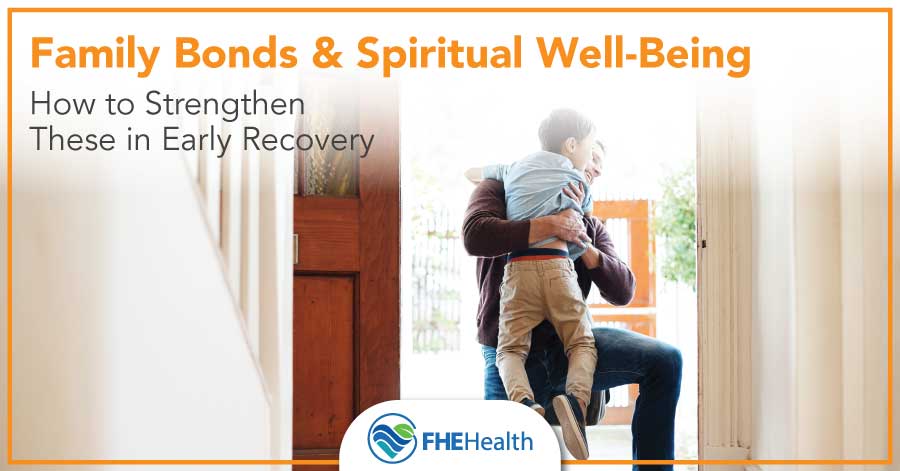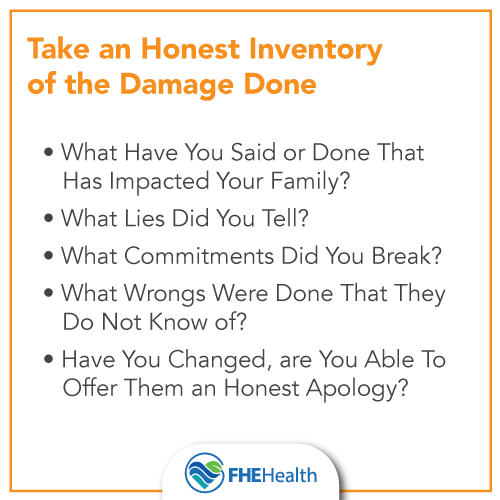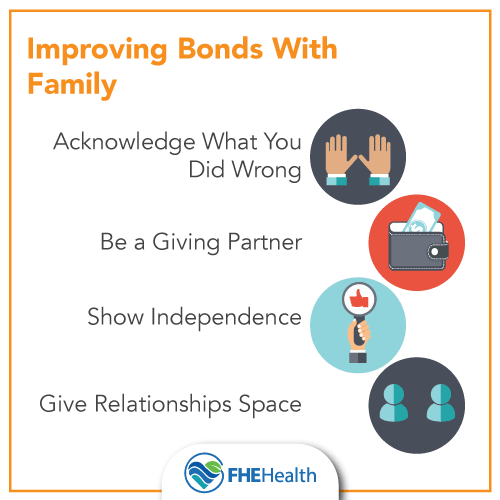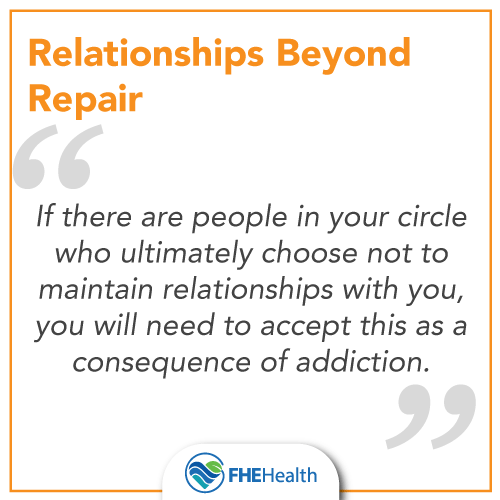
Trust is at the cornerstone of all relationships, both platonic and romantic. Trust enables individuals to share secrets, discuss life challenges and seek advice. It also plays an integral role in maintaining a reputation of reliability — if someone you trust says they will do something, you can generally accept that they will stay true to their word.
However, nothing erodes trust faster than the behavior demonstrated in active addiction. Those facing addiction may lie, break promises, disregard important information, forgo plans, forget about favors, steal resources and fail to be a source of support. While a few mistakes here and there can be forgiven in a strong relationship, too many negligent or disrespectful actions can sever the ties of a friendship, familial bond or marriage in a way that may be irreversible — at least in the immediate future.
If you’ve tested the strength of your trusted relationships due to your use of drugs or alcohol, you may feel as if these bonds are gone for good. However, with an honest evaluation of your actions and the right approach to rebuilding trust, you may be able to recover what you’ve lost.
Assessing the Damage
 Entering rehabilitation and getting started on the road to recovery may feel like a fresh start to you, but those you hurt while using drugs or alcohol may not see it in the same light. You’re ready to turn the page, but anyone you betrayed will likely be less forgiving without seeing a true dedication to lasting change.
Entering rehabilitation and getting started on the road to recovery may feel like a fresh start to you, but those you hurt while using drugs or alcohol may not see it in the same light. You’re ready to turn the page, but anyone you betrayed will likely be less forgiving without seeing a true dedication to lasting change.
Many people living in addiction make excuses for their behavior or try to downplay past actions in order to deny the reality of the situation. All the mistakes you made, no matter how minor or infrequent these occurrences may have been, affect how you’re seen by others, and that includes those who know you best.
In order to determine where to begin, you need to be honest with yourself in assessing the damage. What did you say or do that could have strained the bonds of trust? What lies did you tell, no matter how small? What commitments did you break, and what appointments did you miss? Even little things you think went unnoticed, like lies of omission, may play a role in how your relationships began to deteriorate.
You can’t make amends until you know where you went wrong. By taking an honest look at how addiction affected others, you can create a game plan for how to rebuild trust. It is often possible to restore relationships to some semblance of what they used to be, but doing so isn’t an easy process.
How to Improve Bonds With Family and Friends
 As you progress through recovery and begin to expand your goals from internal to external, it’s natural to feel strongly about your support system. At this stage, you may begin to reach out, only to find yourself facing hesitant responses and a lack of warmth.
As you progress through recovery and begin to expand your goals from internal to external, it’s natural to feel strongly about your support system. At this stage, you may begin to reach out, only to find yourself facing hesitant responses and a lack of warmth.
When you hurt people and break their trust, you’re not going to immediately be able to pick up where you left off. However, this doesn’t mean you have to leave these relationships behind. With these tips, you can take the necessary steps to improve your connections to the important people in your life.
Acknowledge What You Did Wrong
Addiction has a way of changing people, and your friends and family certainly see the ways in which addiction changed you. After witnessing your poor choices, they’re going to continue to believe you are this changed person until you prove otherwise.
By acknowledging what you did wrong, admitting the influence of your addiction and apologizing, you may be able to convince your friends and family that you are once again who you were before you began using and fell on tough times. This step essentially says, “I know I changed due to drugs and/or alcohol, and I don’t want to be that person anymore.”
If you are working a 12-step program, this is a part of the process, so embrace this opportunity with open arms.
Be a Giving Partner
Those in addiction often take and take without giving anything back in return. If you want to prove that things are different, this behavior needs to end.
Most healthy relationships involve give and take, but when you’ve been taking without giving, it’s important to make sure things go in the other direction for a while. If you are asked to do favors, run errands, listen to a troubling situation or be present for a personal matter, do it. You need to show that you aren’t in relationships to use people; instead, you’re in relationships to provide one side of a mutually beneficial partnership.
Show Independence
When you’re in the early stages of recovery, reaching out for help is a common urge. It’s understandable — what you’re going through is a big commitment and an overwhelming life change. However, if you want to rebuild relationships, you need to limit the amount and the extent of help you request.
You may need support to get on your feet, particularly if you are still seeking a job or a car, but as soon as you are able, do everything in your power to show that you are independent and able to take care of yourself. Standing on your own two feet is a mature and adult step to take. When you are able to achieve this, you are able to demonstrate that you are on your way to being the person you used to be.
Give Relationships Space
You may feel that your relationships are the same as they always were when you are sober, but it’s unlikely that the loved ones you have hurt will see this the same way. As such, if people don’t respond in the way you want them to, don’t hold this against them.
Rebuilding relationships isn’t something that happens overnight. You may be ready to right the ship, but those with whom you are working to mend fences may need more time to be ready to trust you again. Give these kinds of relationships space and time. Focus on yourself and your recovery, and allow those who are cold or distant with you time to open up to you on their own terms.
Relationships Beyond Repair
 It’s nice to believe that everything can go back to normal once you are sober, but this isn’t always the case. No matter how hard you try, there are some relationships that may be beyond redemption. These are often the people you have hurt the most — possibly people who you have hurt physically or emotionally, people you have taken money from or people who have been fooled by your addiction one too many times.
It’s nice to believe that everything can go back to normal once you are sober, but this isn’t always the case. No matter how hard you try, there are some relationships that may be beyond redemption. These are often the people you have hurt the most — possibly people who you have hurt physically or emotionally, people you have taken money from or people who have been fooled by your addiction one too many times.
In these cases, you can give rebuilding trust your all, but it may not be possible. If there are people in your circle who ultimately choose not to maintain relationships with you, you will need to accept this as a consequence of addiction. You can continue to reach out and make your feelings known, but there’s no way to force someone to remain connected to you, no matter how bad you want it.
Can Relationships Ever Be the Same?
Addiction is a serious thing and, as such, the ramifications are serious, too. In virtually all cases of substance abuse, whether long-term or short in duration, have consequences on personal relationships, like family, friends and partners. Unfortunately, there’s generally no way to avoid this — as they say, you can’t have your cake and eat it, too.
With effort, dedication and a commitment to sobriety, it is possible to restore some relationships to their former standing, but it’s important to realize that this isn’t true for every bond in your life. Even those people who do come back to you may not be willing to maintain the same closeness or dynamics that you enjoyed previously.
If you are one of the nearly 25 million Americans living with addiction and all of its many consequences, getting help is imperative. At FHE Health, we are dedicated to providing the resources necessary to get clean and build a healthy foundation for the future. From offering a medically supervised environment for detox and recovery to addiction counseling that teaches coping methods and ways to strengthen relationships, we can arm you with everything necessary to succeed. Please contact us today for a confidential intake interview and learn more about what we have to offer.






